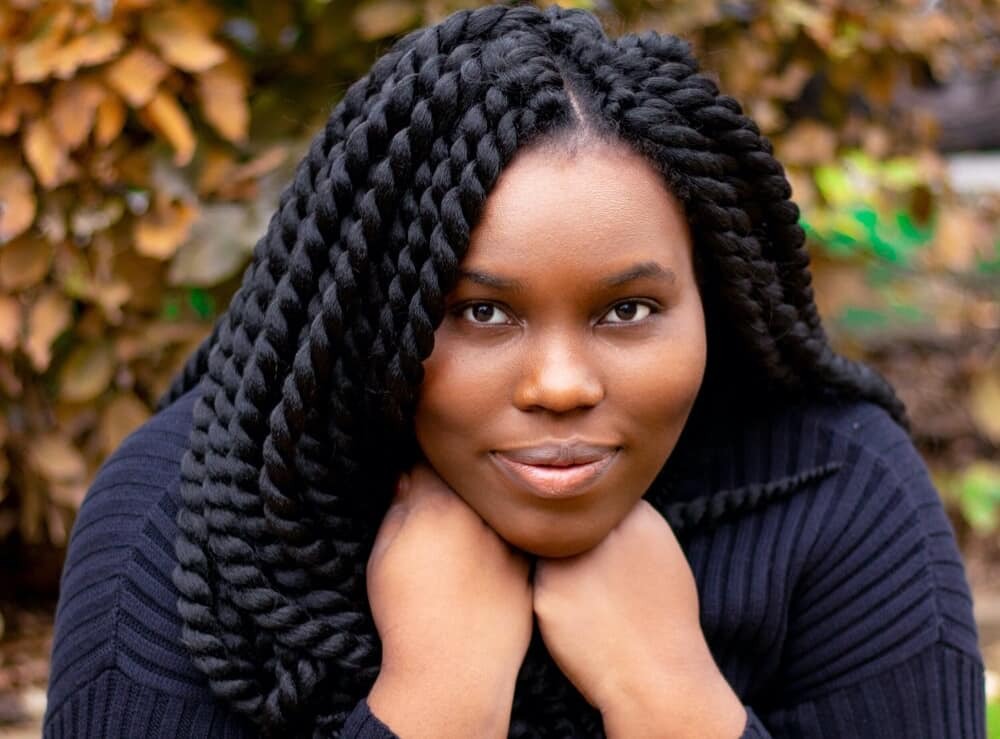You are viewing your 1 free article this month. Login to read more articles.
Springboard: Faridah Àbíké-Íyímídé, Ace of Spades
University student Faridah Àbíké-Íyímídé’s début novel Ace of Spades may not be out until 10th June, but it’s already making a splash. Expectation for the YA thriller, which is pitched as “‘Get Out’ meets ‘Gossip Girl’”, has been high: it was signed by Usborne in the UK in 2018, and last year it was snapped up by Macmillan in the US in a seven-figure, two-book deal. Àbíké-Íyímídé has been “so surprised” by the level of buzz around the book. She expected that it might not even secure a book deal because “there are so many barriers for authors of colour”. Writing has been a passion of hers since the age of 10, so while the publishing process has been “very nerve-wracking and worrying” in some ways, it has also been “exciting, because it’s something I’ve always wanted to do”
The book focuses on the only two Black students at the exclusive Niveus Private Academy, head girl Chiamaka and talented scholarship student Devon, who become the target of a gossip campaign started by the mysterious Aces. It was influenced by TV shows that Àbíké-Íyímídé loves, such as “Gossip Girl” and “Pretty Little Liars”, and by her desire to see “more Black main characters in the really cool leading roles”. It also draws on her obsession with the “sinister rituals” and “casual opulence” of private schools. Another inspiration was the author’s own experience of moving from south London to Scotland for university and the “shock of how there wasn’t much diversity where I was”. She expands: “There is a reason why you don’t see as many Black and brown faces in universities, especially from my point of view as a person from a working-class background. So many of my friends were not able to get in because there were so many barriers in their way. I wanted to explore that in a book and show how that works from a structural level.”
The narrative is told from the viewpoint of both protagonists in alternating chapters. Àbíké-Íyímídé came up with her leads through a combination of recognising what kinds of characters she likes to read about herself, as well as considering “things I wanted to see more in literature when it comes to the representation of Black people”. She explains: “With Chiamaka, I wanted to write a strong Black leading lady and have her be very complex. There’s such a stereotype of ‘the angry Black woman’ but also there’s also a stereotype of us being indestructible and two-dimensional. I wanted to show a character that was flawed, and give Black teenagers someone that is human. With Devon, I really wanted to show that Black boys can be very emotional and that they have feelings and experiences that need to be heard.”
The two begin the book not particularly liking or trusting each other, and Àbíké-Íyímídé says making them so contrasting was a conscious choice. “Black people are not a monolith—we all come from different households and cultures and backgrounds—but people often group us together as if we’ve all had the same experiences and lives. Something we all have in common is that we’re in a system that is perpetuating white supremacist ideologies, so we’re all being affected by the views that we are taught. I wanted to show that in order to destroy the system, you have to come together and put aside your differences.”
An inner struggle
One of the things Devon struggles with is keeping his identity as a young gay Black man secret. Àbíké-Íyímídé says part of her reasoning for covering this issue in the book is that “almost all my friends are queer, and I saw a lot of the internal battles they had to face”. She adds: “Also, I know so many queer teens and I wanted to make sure they felt seen, especially Black queer teens, because I don’t think they get that representation.” As a scholarship student, Devon is also significantly less economically privileged than most of his classmates. Àbíké-Íyímídé felt it was important to highlight economic privilege in the book, because “when you’re working- class, no matter what environment you enter, it’s going to follow you”.
Conversely, Chiamaka is from a wealthy family, but she is still acutely aware of the fact that she is not a “heritage” student with longstanding family links to her school, unlike some of her friends. Àbíké-Íyímídé says: “I wanted to show how legacy can be built and how even Black people that are rich are at a different starting point.” With this in mind, Chiamaka navigates her academic and social life carefully, applying herself at school and using people to increase her status within the school’s hierarchy. However, her years of hard work are thrown into jeopardy when the anonymous Aces start to spread rumours about her and Devon. As the pair try to figure what is happening, they discover something bigger is at play. Àbíké-Íyímídé wanted to explore racism on a less personal and more systemic level because “racism is often discussed in terms of one-on-one interactions, but there’s a more sinister form of racism that people of colour experience every day. I wanted to show how insidious it is and show how, even when you’re not seeing it, it’s happening. It eventually spirals, and has lifelong repercussions.”
In terms of plotting the book’s mystery element, she created a very detailed 12,000- word outline before writing, and believes that being an avid reader and viewer of mysteries helped her to know which beats in the story to hit. She says: “It really is difficult because I know that a lot of mystery readers love to play detective. I feel like for me to write a mystery, I have to think ‘What is unexpected?’, but also to make sure the payoff is really good. I write mysteries not necessarily trying to completely shock, but to twist perception.”
She has found it hard to prepare to release her first title during a pandemic, but has been able to connect with a community of other début writers online. Despite worries about whether or not she can get into bookshops and see her novel on the shelves, she says publishing Ace of Spades has “still been a really positive experience, and I’m excited for the year ahead”. She is currently working on another thriller that is “more about friendships and feminism”, and it will centre a Black Muslim, like herself. Though there is no fixed publication date yet, she is looking forward to putting “a really nice girl-power story” out into the world.
Considering future projects, she says: “I want to explore identity in ways that aren’t being explored in the mainstream. I constantly want to make sure that teenagers reading feel represented by the characters.” She adds: “Black kids and kids of colour really need to be shown that they deserve to be in these stories, they deserve to be in adventures, solving interesting crimes. It’s so important to show that, because when you’re growing up and no one tells you that you matter, you start to believe it. I think books are a place to show people they matter.”
Ace of Spades (9781474967532) is published by Usborne on 10th June. The paperback costs £8.99.










